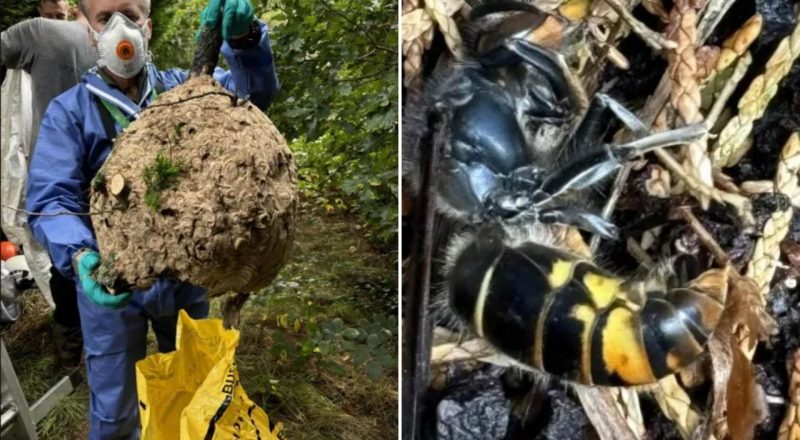A STARK warning has been issued after a shocking picture of a nest of deadly Asian hornets, as big as a beach ball, was found in a UK town.
Experts and climbers were summoned to remove a huge nest of deadly hornets in Hampshire on Tuesday.
The nest was located in a tree at The Old Cemetery on Southampton Common.
Described as “apex predators”, the Asian hornets inject their poison 3.5mm into a human’s flesh.
In the event of being attacked, experts advice is to “cover your head and run”.
Just days ago, a 77-year-old woman was stung and killed by the Asian hornets during a mass attack in Brittany, France.
The woman was stung multiple times while on a hiking trip and despite the emergency services best efforts, she was pronounced dead at the scene.
Experts were first warned after a photo of the Southampton discovery was uploaded to the Asian Hornet Watch app.
To trap the deadly beasts, researchers used bait to track them back to the nest and then inject it with poison.
The nest was removed and the size of it compared to that of a beach ball.
Alan Baxter, Asian Hornet Coordinator for Hampshire has issued a stark warning to residents in the area.
He said: “Yesterday it was good to see our operation in action.
“It was one of the biggest (nests) which suggests it was quite a well-established colony.
“It was about 75 cm across. The National Bee unit has left a monitoring station there.
“We hope for the best and expect the worst so I wouldn’t be surprised if there are more but that is purely speculation.
“If it is a homegrown one then we have got a problem on.
“If you do see one walk away quickly. Don’t stop and look at it.
“If you see a nest take a photo with your mobile phone. In the unlikely event that you are attacked, cover your head and run.”
The hornets are not only a danger to humans, but the environment and other wildlife, particularly to bees.
Mr Baxter urges people to download the Asian Hornet App to share any spotting’s of the hornets and alert experts.
The expert continued to explain that very young and elderly people are at a greater risk.
He added: “There were 72 nests found and destroyed last year in the UK. This year so far there have been 18.
“They come in as hitchhikers. There are thousands of them all over Europe.
“Here in Hampshire, we have the Hampshire Asian Hornet Contingency Plan which I wrote.
“We consider ourselves to be quite well prepared. Over the UK we have a network of 2,500 beekeepers. We have got a very good network.”
The Southampton nest has now been sent to a laboratory for experts to assess how long it had been there for.
Totton, Gosport and Portsmouth are among some of the other places where there have been similar discoveries in the south of England.
What to do if you’re stung by an Asian hornet & symptoms to look out for
If anything is left on, or in your skin, the first thing you need to do is remove it carefully, according to the NHS.
- Brush or scrape the stinger sideways with your fingernail or the edge of a bank card.
- Do not use tweezers to pull out a stinger as you could squeeze poison out of it.
- Wash the area with soap and water.
If there’s nothing in your skin, or you’ve removed it, wash your skin with soap and water to help lower the chance of infection.
The bite or sting should get better in a few days. There are some things you can do to ease your symptoms.
DO
- Put an ice pack wrapped in a cloth or a clean cloth soaked in cold water on the bite or sting for at least 20 minutes, if it’s swollen
- Keep the area raised if you can
- Take painkillers such as paracetamol or ibuprofen if the sting is painful
- Use antihistamines to relieve any itching
- Use a hydrocortisone cream to reduce itching and swelling
DON’T
- Do not scratch the bite or sting, as it could get infected
- Do not use home remedies such as bicarbonate of soda to treat the bite or sting
You should ask for an urgent GP appointment or call 111 if:
- Your symptoms get worse or are not getting any better
- You were stung in your mouth or throat, or near your eyes
- You have tummy pain and are being sick
- You feel dizzy or lightheaded
- A large area around the bite or sting becomes red and swollen
- You have a high temperature and swollen glands
- You were stung more than once
- You’ve had a serious allergic reaction to an insect bite or sting before
Call 999 if:
- Your lips, mouth, throat or tongue suddenly become swollen
- You’re breathing very fast or struggling to breathe (you may become very wheezy or feel like you’re choking or gasping for air)
- Your throat feels tight or you’re struggling to swallow
- Your skin, tongue or lips turn blue, grey or pale (if you have black or brown skin, this may be easier to see on the palms of your hands or soles of your feet)
- You suddenly become very confused, drowsy or dizzy
- Someone faints and cannot be woken up
- A child is limp, floppy or not responding like they normally do (their head may fall to the side, backwards or forwards, or they may find it difficult to lift their head or focus on your face)
You or the person who’s unwell may also have a rash that’s swollen, raised or itchy.
These can be signs of a serious allergic reaction and may need immediate treatment in hospital.







